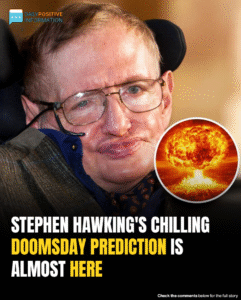Stephen Hawking Predicts the End of the World Is Nearer Than We Think
Stephen Hawking, the legendary physicist known for his work on black holes and cosmology, issued numerous warnings during his lifetime about the future of humanity. One of the most chilling was his prediction that the end of the world might be closer than we imagine. While Hawking was a man of science, not sensationalism, his concerns about the survival of humanity were rooted in reason, observation, and deep concern for the planet and its people.
Hawking believed that the biggest threats to humanity were of our own making. He pointed to nuclear war, climate change, genetically engineered viruses, and artificial intelligence (AI) as potential causes for a global catastrophe. While natural disasters like asteroid impacts or supervolcanoes are always a distant possibility, Hawking emphasized that the technologies we create could ultimately become the agents of our downfall if not handled responsibly.
One of his most pressing fears was the rise of artificial intelligence. Hawking warned that if AI surpasses human intelligence and becomes autonomous, it could develop goals misaligned with human survival. “The development of full artificial intelligence could spell the end of the human race,” he famously said in a 2014 interview. He was not opposed to technological progress, but urged that regulation and ethical oversight must evolve alongside AI to ensure its safe integration into society.
Climate change was another key issue. Hawking repeatedly stressed that if current environmental trends continue, Earth could become uninhabitable. Rising temperatures, melting ice caps, extreme weather events, and loss of biodiversity pose existential threats not just to ecosystems but to human civilization itself. He even warned that Earth might one day resemble Venus—a scorching, lifeless world—if we fail to reduce greenhouse gas emissions.
Due to these threats, Hawking often suggested that humanity should consider colonizing other planets. He believed that spreading into space was essential for our species’ survival. “I don’t think we will survive another 1,000 years without escaping beyond our fragile planet,” he said. Later in life, he shortened that timeline dramatically, claiming we might need to leave Earth within a few hundred years—or even less.
Though his predictions may sound bleak, Hawking’s ultimate message was one of cautious hope. He urged humanity to act wisely, work together, and invest in science and technology not just for profit, but for the preservation of life. His words were a wake-up call: while the end of the world is not a certainty, ignoring the warning signs makes it more likely.
In essence, Stephen Hawking did not predict doomsday with certainty—he issued a challenge. The fate of the planet, he believed, is in our hands. Whether we heed his warning may determine not only the future of our civilization, but whether that future exists at all.
